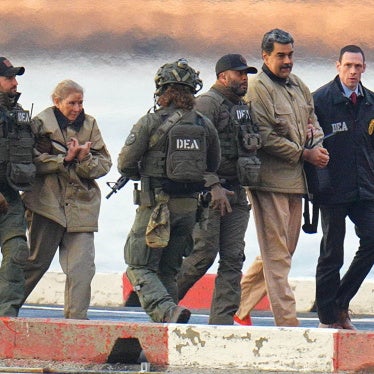At 8 p.m. every night, the lights go off in Venezuelan opposition leader Leopoldo López’s 2-by-2-meter cell at the Ramo Verde military prison outside Caracas. López is the only detainee in the building where his cell is located, and it is necessary to open at least six locked doors to reach him. This isolation alone enhances his risk of abuse or other mistreatment. And all those locked doors might prevent guards from reaching him in an emergency or provide a convenient excuse for not reaching him on time in a fabricated one.
On September 10, López was sentenced to nearly 14 years in prison, after a trial that involved serious due process violations and failed to provide evidence linking him to a crime. During his pretrial detention, prison guards aggressively searched his cell, taking away his children’s drawings, and imposed baseless punishments that deprived him of family visits for months. None of his legal challenges of due process violations during his trial and the abuses he suffered in prison succeeded.
In a country where the judicial institutions mandated to protect those whose fundamental rights are violated by the government no longer display independence, who can protect López?
International human rights monitors at the United Nations and Inter-American human rights systems, and groups like Human Rights Watch, have repeatedly questioned López’s arbitrary detention and conviction. Most recently, in September, the UN Working Group on Arbitrary Detention demanded the immediate release of López, saying that his trial was “conducted behind closed doors and marked by serious irregularities.”
These demands have fallen in deaf ears. The Venezuelan government’s reaction has been to defend the indefensible, claiming that the López case was decided by an independent judge.
This claim does not stand up to scrutiny. The Venezuelan judiciary has largely ceased to function as an independent branch of government since a political takeover of the Supreme Court in 2004 by then-President Hugo Chávez and his supporters. Members of the Supreme Court in fact have openly rejected the principle of separation of powers. Instead, they have publicly pledged their commitment to advancing the government’s political agenda. In addition, a majority of Venezuelan judges do not have tenure and may be removed through processes that lack basic due process guarantees, opening the door to arbitrary removals as a consequence of any decision the government did not like.
Nonetheless, it was not until López’s conviction that some Latin American governments, including Chile, Costa Rica, Paraguay, and Peru, called on Venezuela —with varying degrees of clarity— to respect his basic due process rights. Previously, Colombian and U.S. authorities, as well as former heads of state of several countries, had voiced concern regarding abuses in Venezuela, including in the López case.
Last week, the Organization of American States secretary general, Luis Almagro, responded to a letter by Elías Jaua, Venezuela’s former foreign minister, stating he had the right to meet with the Venezuelan opposition. Almagro said that “democracy is the government of majorities,” but that it also requires “guarantee[ing] the rights of minorities.”
Despite these reactions, unfortunately, most Latin American governments have remained silent. As long as Latin America, and in particular Brazil —given its regional relevance— does not clearly express its concern about the concentration of power and violation of basic rights in Venezuela, and about López’s conviction and detention conditions, Nicolás Maduro will continue to operate under the assumption that he has a blank check to do as he pleases. In López’s case, this could entail huge risks.
Jose Miguel Vivanco is Americas director at Human Rights Watch.








